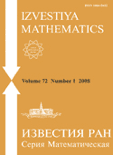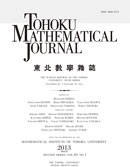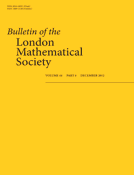
IZVESTIYA MATHEMATICS
Scope & Guideline
Exploring Innovative Solutions in Mathematics
Introduction
Aims and Scopes
- Advanced Differential Equations:
The journal publishes research on various types of differential equations, including quasilinear, elliptic, parabolic, and fractional equations. These papers often explore stability, solvability, and boundary value problems. - Algebraic Structures and Their Applications:
A significant focus is on algebraic theories, including Lie algebras, group theory, and their applications in geometry and topology. This area highlights the interplay between algebraic constructs and other mathematical domains. - Functional Analysis and Operator Theory:
The journal features studies on functional spaces, operator theory, and their implications in mathematical physics and other applied fields. This includes work on Sobolev spaces, Rademacher chaos, and various operator norms. - Geometric Analysis and Topology:
Research in this area includes geometric structures, manifold theory, and topological properties. Papers often delve into the relationship between geometry and analysis, exploring concepts such as Chern classes and homotopy. - Mathematical Physics and Applications:
The intersection of mathematics and physics is well-represented, with papers on topics like quantum control, wave equations, and statistical mechanics. This scope emphasizes the applicability of mathematical theories in physical contexts.
Trending and Emerging
- Fractional Calculus and Differential Inequalities:
There is an increasing number of papers exploring fractional calculus and its applications in various fields, including fluid dynamics and material science. This trend reflects a growing recognition of the importance of non-integer calculus in modeling complex phenomena. - Stochastic Processes and Random Walks:
The journal has seen a rise in publications addressing stochastic processes, particularly in the context of random walks and probabilistic models. This trend indicates a heightened interest in the statistical properties of mathematical models. - Nonlinear Analysis and Optimization:
Recent works demonstrate a significant focus on nonlinear analysis, particularly in the context of optimization problems. This includes studies on critical growth conditions and variational methods, which are increasingly relevant in applied mathematics. - Geometric Topology and Algebraic Geometry:
Emerging themes in geometric topology and algebraic geometry have gained traction, with researchers exploring deep connections between these fields. This reflects a broader trend towards interdisciplinary approaches that link algebraic methods with geometric intuition.
Declining or Waning
- Classical Mechanics and Dynamical Systems:
While still relevant, the frequency of papers focusing specifically on classical mechanics and dynamical systems has seen a decline. This shift may indicate a broader interest in more abstract mathematical theories or computational approaches. - Elementary Number Theory:
Papers dedicated to elementary number theory concepts have become less common. This could suggest a trend towards more complex or higher-dimensional problems, leaving traditional number theory less explored. - Computational Mathematics:
Research focused on numerical methods and computational approaches appears to be waning. The decreasing number of publications in this area may reflect a saturation of previous work or a shift towards theoretical advancements.
Similar Journals

St Petersburg Mathematical Journal
Fostering Collaboration in the World of MathematicsSt Petersburg Mathematical Journal, published by the American Mathematical Society, is a distinguished platform that fosters research and discourse in the fields of mathematics, specifically focusing on Algebra and Number Theory, Analysis, and Applied Mathematics. With an ISSN of 1061-0022 and an E-ISSN of 1547-7371, this journal has been a reliable source of cutting-edge mathematical research since its inception in 2003 and continues to publish high-quality content through 2024. Although not open-access, it offers valuable insights and advances the mathematical community's understanding, as indicated by its respectable impact factor and Scopus rankings across various categories—landing in the Q3 quartile across three significant mathematical disciplines. Researchers, professionals, and students are encouraged to contribute and engage with this journal, as it remains a vital resource for promoting collaboration and discovery within the ever-evolving field of mathematics.

Mediterranean Journal of Mathematics
Bridging Theory and Practice in the World of MathematicsThe Mediterranean Journal of Mathematics, published by SPRINGER BASEL AG, is a prominent platform dedicated to the advancement of mathematical research and education. Since its inception in 2004, this journal has been pivotal in disseminating high-quality research across various fields of mathematics, currently holding a notable Q2 ranking in the miscellaneous mathematics category as of 2023. With its ISSN 1660-5446 and E-ISSN 1660-5454, the journal enjoys a respected position in the academic community, evident by its Scopus rank of 129 out of 399 in General Mathematics, placing it in the 67th percentile. While primarily a subscription-based journal, it remains committed to providing a comprehensive resource for researchers, professionals, and students, fostering dialogue and exploration within the mathematical sciences. The Mediterranean Journal of Mathematics, based in Basel, Switzerland, continues to contribute significantly to the evolution of mathematical theory and practice, marking its relevance as we approach its 20th anniversary in 2024.

TOHOKU MATHEMATICAL JOURNAL
Cultivating a Legacy of Mathematical ScholarshipTOHOKU MATHEMATICAL JOURNAL, published by TOHOKU UNIVERSITY, is a distinguished academic journal committed to the advancement of mathematical research. Established in 1949, the journal has sustained a long-standing tradition of disseminating high-quality, peer-reviewed articles that contribute significantly to various branches of mathematics. With its scope encompassing a broad range of topics within the field, TOHOKU MATHEMATICAL JOURNAL aims to foster intellectual exchange and innovation among mathematicians worldwide. Though currently not an open-access publication, it is indexed in Scopus, holding a respectable Q2 ranking in the miscellaneous mathematics category as of 2023, which signifies its relevance and influence in the academic community. Researchers, professionals, and students alike will find valuable insights and contemporary developments that reflect the journal's dedication to excellence in mathematical scholarship.

ANNALI DI MATEMATICA PURA ED APPLICATA
Exploring the Boundaries of Applied MathematicsANNALI DI MATEMATICA PURA ED APPLICATA is a prestigious journal published by Springer Heidelberg, focusing on the field of Applied Mathematics. With a rich history dating back to its initial publication stages from 1858, this journal continues to serve as a vital platform for researchers and professionals seeking to disseminate high-quality, peer-reviewed research. The journal's strong reputation is reflected in its Q1 ranking in Applied Mathematics and its Scopus rank of #335 out of 635, placing it in the 47th percentile, showcasing its impact in the field. Although it is not an open-access journal, it provides exclusive insights and advancements in mathematical applications, allowing academics to explore innovative methodologies and theoretical developments. The combination of its long-standing tradition and contemporary relevance makes ANNALI DI MATEMATICA PURA ED APPLICATA an essential resource for scholars and students looking to deepen their understanding of mathematics and its practical applications.

Journal of Mathematical Study
Exploring Innovative Methodologies in MathematicsJournal of Mathematical Study, published by GLOBAL SCIENCE PRESS, stands as a prominent platform dedicated to advancing knowledge in the field of mathematics. With ISSN 2096-9856 and E-ISSN 2617-8702, this journal aims to disseminate high-quality research articles, reviews, and theoretical studies that encapsulate the latest developments and innovative methodologies within mathematical sciences. Although it is currently not open access, the journal strives to provide comprehensive insights into a spectrum of mathematical disciplines, catering to researchers, students, and professionals seeking to deepen their understanding of both pure and applied mathematics. The Journal of Mathematical Study plays a critical role in fostering scholarly communication and collaboration, making it an essential resource for anyone invested in the rapidly evolving world of mathematical research.

HOUSTON JOURNAL OF MATHEMATICS
Unveiling New Perspectives in Mathematical DisciplinesHOUSTON JOURNAL OF MATHEMATICS, published by the University of Houston, serves as a valuable platform for disseminating significant findings in the field of mathematics, specifically within the realm of miscellaneous mathematics. Despite its current categorization in Q4 for 2023, the journal plays a crucial role in fostering academic discussion and exploration among researchers, professionals, and students alike. With its ISSN 0362-1588, the journal has been publishing original research since 1996, with a recent gap filled from 2022 to 2023, thereby continuing to contribute to the mathematical community. While it does not currently offer open access options, the journal's commitment to quality research maintains its relevance within the field and invites submissions that can elevate its standing. Located in the vibrant city of Houston, Texas, the journal not only emphasizes theoretical advancements but also encourages applied mathematical research that intersects with other disciplines, enhancing its significance and reach.

ANNALES DE L INSTITUT FOURIER
Advancing Mathematical FrontiersANNALES DE L INSTITUT FOURIER is a premier academic journal published by ANNALES INST FOURIER, specializing in the fields of Algebra and Number Theory as well as Geometry and Topology. Since its establishment, the journal has garnered a distinguished reputation, evidenced by its Q1 quartile ranking in the 2023 category assessments and its Scopus Rank of #37 out of 119 in Algebra and Number Theory, and #34 out of 106 in Geometry and Topology, placing it within the top percentile of its field. The journal serves as a vital platform for disseminating groundbreaking research and innovative methodologies, catering to a global audience of researchers, professionals, and students. With a commitment to the advancement of mathematical sciences, ANNALES DE L INSTITUT FOURIER invites contributions that push the boundaries of knowledge and foster collaboration across disciplines. Although it does not offer open access, the rigorous peer-review process ensures that published papers meet the highest academic standards, making it a critical resource for anyone engaged in advanced mathematical research.

Archivum Mathematicum
Unveiling the Depths of Mathematical ScienceArchivum Mathematicum is an open-access journal dedicated to the broad spectrum of Mathematics, published by Masaryk University, Faculty of Science in the Czech Republic. Since its inception in 1965, this journal has provided a platform for the dissemination of research and advancements within the mathematical sciences. It spans converged years from 2004 to 2024, ensuring ongoing relevance in a rapidly evolving discipline. Currently categorized in Q4 for 'Mathematics (miscellaneous)' and ranked #316/399 in general mathematics by Scopus, the journal aims to foster a collaborative environment for researchers, practitioners, and students alike, encouraging submissions that contribute to mathematical theory, applications, and education. With its commitment to open access, Archivum Mathematicum is a vital resource for anyone seeking to stay informed about emerging trends and findings in the field.

BULLETIN OF THE LONDON MATHEMATICAL SOCIETY
Cultivating Knowledge and Innovation in MathematicsThe BULLETIN OF THE LONDON MATHEMATICAL SOCIETY, published by Wiley, is a distinguished journal that serves as a vital resource in the field of mathematics. With its ISSN 0024-6093 and E-ISSN 1469-2120, this journal has consistently provided a platform for innovative research and scholarly discourse since its inception in 1969. Recognized for its quality, it currently holds an impressive Q1 ranking in the mathematics category, a testament to its significance in disseminating influential findings and trends in the mathematical sciences. Researchers and practitioners can rely on the BULLETIN for its comprehensive coverage of both theoretical and applied mathematics, which caters to a diverse audience ranging from professionals to students alike. Though it does not currently offer Open Access options, its articles can be accessed through institutional subscriptions, ensuring that significant works reach the academic community effectively. With contributions that span over five decades, the journal continues to shape mathematical research and inspire future advancements in the discipline.

Aequationes Mathematicae
Elevating Mathematical Discourse Since 1968.Aequationes Mathematicae is a distinguished academic journal published by SPRINGER BASEL AG, focusing on the dynamic fields of Applied Mathematics, Discrete Mathematics, and Combinatorics. Since its inception in 1968, the journal has served as a vital platform for disseminating high-quality research, with Converged Years expected to extend to 2024. With an impressive Q2 ranking in multiple mathematical disciplines as of 2023, Aequationes Mathematicae is positioned within the top half of its field, reflecting its reputation for excellence. Spanning the globe from its base in Basel, Switzerland, this journal is ideal for researchers, professionals, and students seeking to advance their knowledge and contribute to ongoing discussions within mathematics. While it does not currently offer Open Access options, readers can still access an extensive archive of impactful studies that bolster its standing within the academic community.